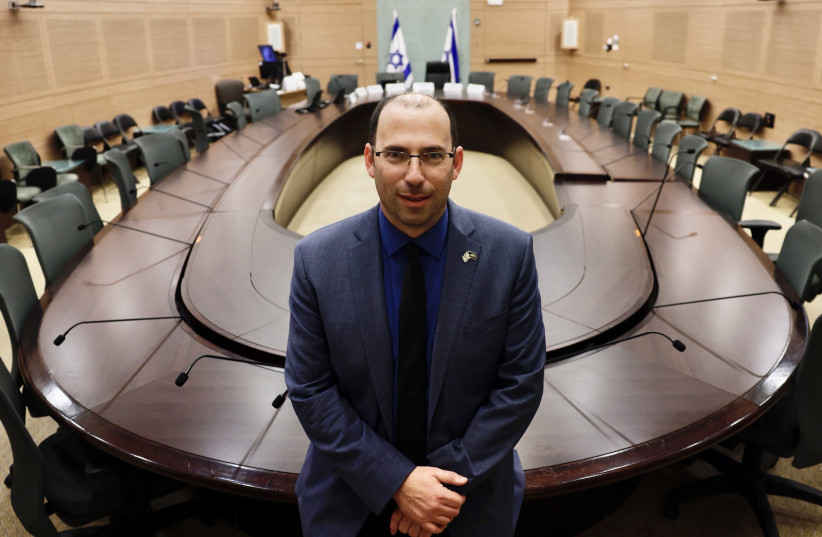As the government’s judicial reform plan entered a new stage this week with its first bills arriving before the Knesset plenum on Monday, the man who has played a central role in pushing the legislation forward was feeling energized.
Sitting in his Knesset office on Wednesday after another busy day of votes that could lead the way for the judicial overhaul Prime Minister Benjamin Netanyahu’s coalition is determined to institute, Constitution, Law and Justice Committee chairman and Religious Zionist Party MK Simcha Rothman took stock of the reform’s progress in a discussion with The Jerusalem Post.
The so-called Deri 2 and Saada Laws had gone through preliminary readings, as had his private reform bill creating an override clause and limiting judicial review to a full bench of High Court justices in unanimity. It would now return to his law committee for further deliberations. All week he had led debates on a similar committee bill, including that morning.
“Almost everyone understands that the judicial system needs to be fixed with significant corrections. Even if there is a debate about what they are and to what degree, it means that the idea has passed."
Simcha Rothman
While at times during the week’s sessions, he appeared exhausted and stretched thin, on Wednesday he appeared in good cheer and presented an excited intensity when discussing the reforms. Rothman highlighted the success of establishing the need for reform even among the opposition, and the challenges of what he said was ungenuine political engagement by critics.
“We passed the first stage [of the reform]. This is very important. I think that for a great many people in the coalition, this vote was a very significant event,” Rothman said from his small office lined with shelves of books and maps of Israel.

While there had been some disagreements, the coalition had banded together on the reform.
“We’re all on the same page,” he said in English. As the descendant of American immigrants, with a wry grin, he occasionally peppered his speech with English idioms and phrases.
Rothman’s great success, as he saw it, was that not just the coalition was on the same page. Everyone, he said, had come to understand the problems with the justice system and the need for reform.
“Almost everyone understands that the judicial system needs to be fixed with significant corrections. Even if there is a debate about what they are and to what degree, it means that the idea has passed,” said Rothman. “The president agrees that we need to do a reform – there are arguments on the details, but the president agrees that there’s a need for reform – in the opposition they say there needs to be reform, and these things at the end of the day are a big success.”
For Rothman, widely considered the chief architect of the judicial reforms that were initially proposed by Justice Minister Yariv Levin in early January, this agreement on the problem created even greater necessity to properly discuss solutions.
“The progress, the amount of discussions, the depth of the discussions, the public interest in the discussions, which in my view is important, even if there are those who criticize; the fact that a discussion [is taking place] on an issue that in my view is extremely important in the State of Israel, which is, will we become a democracy, or will we become a judicial dictatorship? The very existence of the discussion in the committee and the interest it generates” – all this is important, Rothman explained.
“We are dealing with issues that are very complex, he continued. “Members of the Knesset should understand them; the public should understand them. They are issues of constitutional theory. They are weighty issues; we take them very seriously. It requires engaging in the discussion on the part of the speaker, on the part of the listener.”
Fostering debate in difficult circumstances
Rothman became animated when he expressed his frustration that the opposition had attacked him for engaging in debate with his committee’s legal adviser, Gur Bligh, during the committee sessions. He said that he should be able to disagree with Bligh, as part of properly exploring the issues.
“We’re not moving Israel from normal to extreme; we’re moving Israel from extreme to normal. What we have today is a judicial tyranny in Israel."
Simcha Rothman
The RZP MK thought he had done a good job of fostering debate in the committee, even if it wasn’t always perfect. He noted, with some bemusement, that an opposition member, Labor MK Gilad Kariv, spoke more than any other committee member, according to his statistics. While the committee had seen parts of its most chaotic sessions make headlines, Rothman contended that there wasn’t that much shouting.

“There’s almost no shouting. We checked the data, the number of hours, how many hours of discussion were held,” said Rothman. “Let’s say a sixth of the committee deliberations was shouting. This would mean that out of 48 hours of deliberations, eight hours were shouting. That’s a lot, but it means that 40 hours of high-level debate on legal theories, international comparison, input from experts, were calm.”
While he said he tried his best to maintain calm, sometimes those raving and climbing tables – referencing Yesh Atid MK Yorai Lahav Hertzanu’s session conduct – had to be removed from the room.
Rothman shared the product of the debates, ideas that the opposition had presented that he thought were good or interesting proposals.
“It is worthwhile to establish a special procedure for Basic Laws. It’s in truth correct,” he said.
Currently, there is no distinct procedure for legislating Israel’s quasi-constitutional Basic Laws. The act of calling legislation a Basic Law is largely what makes a law a Basic Law.
He also said he was interested in “the argument that maybe we put too many barriers for judicial review,” the ability for the High Court to strike down legislation it determined was in contradiction with the Basic Laws. “Minister Levin speaks about fewer [barriers] than this.”
Rothman said these and many other good points emphasized the importance to speak and participate and not to yell.
“Present a formula, not a cancellation that strikes out the idea that the people of Israel are able to choose their judges. You can present a way to balance the powers. Proposing that judges and law faculty deans would control the judge selection committee isn’t serious and doesn’t address the problem that they’re trying to solve,” said Rothman.
I try to pay attention to them [the public], because many are worried, but many are also dealing with lies. They’re talking about The Handmaid’s Tale and wearing red cloaks.”
Simcha Rothman
Rothman and Levin’s camp has found it unacceptable that nonelected officials would decide which judges are promoted or appointed. A set of bills passed first readings on Monday that changed the composition of the Judicial Selection Committee to give politicians a majority.

Rothman said that if one simply wishes to be against the reform, “vote against it, fine; this is the reason there’s a coalition and opposition. But if you want to propose new provisions, let’s go.”
However, Rothman contended that the opposition was not dealing in good faith; its criticism was completely political.
Anarchy in government
“I think that most of the criticism is not about the reform, but also the noise from the public. I try to pay attention to them [the public], because many are worried, but many are also dealing with lies,” said a frustrated Rothman. “They’re talking about The Handmaid’s Tale and wearing red cloaks.”
Rothman dismissed the idea that Israelis’ rights were at risk. There was no such law nullifying rights, and he said the idea was ridiculous that people thought female members of the coalition like RZP MK Michal Waldiger would agree on an agenda to take away women’s voting rights. Likewise, he didn’t see the haredi parties drafting laws requiring kippot.
“These aren’t things being said in a protest by some anarchist; these are things being said by the anarchists at the head of parties, Yair Lapid and Merav Michaeli. That’s how they’re speaking. These are the lies that they’re distributing,” he said. “How does this advance the discussion?”
Rothman decried violent and aggressive rhetoric, saying that it had consequences.
“We shouldn’t have to talk about how I’m a committee chairman and I need to go around with security. It doesn’t happen for no reason,” said Rothman.
During the conversation, he was interrupted by his wife, who had been concerned by the security situation and had to be consoled. Later he noted that his security detail had been elevated to the highest level.
“Stop these lies, come speak like a human being, stop burning the country – but no, Yair Lapid is on a BDS [Boycott, Divestment and Sanctions] campaign against the state,” said Rothman. “He is going around the world and doing a BDS campaign,” he said, noting that some Jewish groups have discussed ceasing donations to Israel under the current government.
Rothman didn’t think this political campaign could continue, however.
“I think that as time passes, the lies will be revealed. You can fool some of the people some of the time, but you can’t fool everyone all of the time,” he said again in English. “If Netanyahu is that much of a Hitler like they [opposition members] say, why are they photographed smiling with him?”
Highlighting proof of lack of good faith, Rothman said that, prior to the reform, Lapid had issued a call not to cooperate with the new government. Rothman said that preconditions for negotiating under the Herzog framework with opposition members was not expected practice for Rothman’s engagement with the previous government.
President Isaac Herzog has called for negotiations on the reforms, presenting two weeks ago a five-point plan. However, Lapid and other opposition leaders have refused to take part unless the legislative process ceased.
Not against negotiating
Rothman said that he is open to negotiations and that he prefers to pass legislation on which there is wide agreement. He said that his camp had already made compromises.
“Let’s just say that there was a theory for even faster promotion [of the judicial reform], but I really like serious discussions in the committee, and I think they improve the law, and I’m willing to invest the time in them, even if it means that some things will wait until the summer. Parts we’ve already delayed, such as the subject of legal advisers,” said Rothman.

Levin proposed in January that government legal advisers should be required to offer legal opinions in line with the agenda of the government, rather than independent positions in opposition. Rothman noted that, so far, they had only touched on three of the six items initially proposed by Levin.
Going forward, Rothman said, “Now we have to see how we manage to advance the reform without giving up the important principles, as much as possible. That is the challenge.”
The most important parts were being advanced now. Limiting the court’s ability to intervene in Basic Laws was just the bare minimum. Rothman would ask American audiences to consider if it would be acceptable for the US Supreme Court to decide what would and wouldn’t be in the US Constitution.
“We’re not moving Israel from normal to extreme; we’re moving Israel from extreme to normal. What we have today is a judicial tyranny in Israel,” Rothman said in English.
“There is no other court in the world that writes its own constitution, gives themselves the power of the court to cancel laws, decide what’s in the constitution that they just created, and tell the Knesset that they can’t amend the constitution. That’s the situation today. And we reached this place because the court isn’t just activist; it’s hyper-activist.”
Rothman summarized that what the Israeli people can expect from the reform is that “we will have a true democracy. What the nation decides it will get.”
